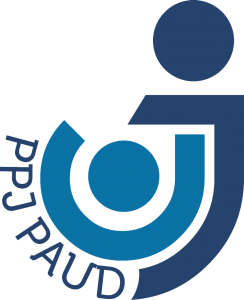Studi Deskriptif Membaca tanpa Mengeja untuk Menstimulasi Kemampuan Literasi Anak Usia 5-6 Tahun
Descriptive Study of Reading Without Spelling to Stimulate Literacy Skill of Children Aged 5—6 Years
DOI:
https://doi.org/10.37680/absorbent_mind.v3i1.2665Keywords:
literacy, reading without spelling, skill of childrenAbstract
This study was conducted with the aim of describing reading activities without spelling to stimulate the literacy ability of children aged 5-6 years in TK Darma Wanita 20 Kembiritan. The study used a qualitative descriptive model. Data collection using observation techniques, interviews, and documentation studies. Data were analyzed during the study (on going process). From the results of the study, data were obtained that early literacy skills (reading) for early childhood using the method of reading without spelling are more efficient than conventional methods (spelling). The reading without spelling method helps students be able to read more complicated sentences within 6 months. This of course must be adjusted to the abilities of each student. So, it can be concluded that strategies in stimulating early childhood literacy skills can be successful if the methods used are in accordance with the characteristics of early childhood learning.
References
Andriyani, R., Masrul, M., & Fauziddin, M. (2018). Pengaruh Metode Becerita terhadap Kemampuan Kosakata Anak Usia Dini. Aulad : Journal on Early Childhood, 1(1), 18–27. https://doi.org/10.31004/aulad.v1i1.3
Bakken, L., Brown, N., & Downing, B. (2017). Early Childhood Education : The Long-Term Benefits Early Childhood Education : The Long-Term Benefits. Journal of Research in Childhood Education, 31(2), 255–269. https://doi.org/10.1080/02568543.2016.1273285
Fajriyah, L. (2018). Pengembangan Literasi Emergen Pada Anak Usia Dini. Proceedings of The ICECRS, 1(3), 165–172. https://doi.org/10.21070/picecrs.v1i3.1394
Fitri, N. L. (2021). Peran Orang Tua Dalam Menumbuhkan Minat Baca Anak Usia 5-6 Tahun. Al-Hikmah: Indonesian Journal of Early Childhood Islamic Education, 5(2), 122–132.
Fitriawan, F., Krisnawati, N., Eviyanti, N. P., & Ulfa, R. A. (2022). Peningkatan Berhitung Anak Usia Dini Menggunakan Alat Permainan Edukatif Apron Hitung. Absorbent Mind: Journal of Psychology and Child Development, 2(02), 111–122.
Hasna, M. (2020). Mengembangkan Berbahasa Anak Usia Dini Melalui Metode Bercerita. 1(1).
Istiyani, D. (2013). MODEL PEMBELAJARAN MEMBACA MENULIS MENGHITUNG. Jurnal Penelitian, 10(1), 1–18.
JR, R. R., Luthfi, A., & Fauziddin, M. (2018). Pengaruh Metode Bercerita terhadap Kemampuan Menyimak pada Anak Usia Dini. Aulad : Journal on Early Childhood, 1(1), 39–51. https://doi.org/10.31004/aulad.v1i1.5
Meutia, C. (2021). Peningkatan Hasil Belajar dan Kemampuan Berpikir Kritis Siswa dalam Materi Perhitungan Kimia Melalui Model Pembelajaran Problem Based Learning. Jurnal Kinerja Kependidikan (JKK), 3(1), 39–60.
Miles, M., & Huberman, M. (1992). Qualitative Data Analysis (Diterjemahkan oleh Rohidi (ed.); Cetakan pe). Universitas Indonesia (UI-Press).
Mufid, A., Fatimah, S., Aeeni, N., & Asfahani, A. (2022). Meningkatkan Perkembangan Kecerdasan Naturalistik melalui Metode Outbound (Studi RA Muslimat NU XVII Keser). Absorbent Mind, 2(02), 1–9.
Muhammad Fadillah. (2016). DESAIN PEMBELAJARAN PAUD.pdf. umpo.
Pertiwi, A. D., Universitas, P., & Yogyakarta, N. (2016). STUDY DESKRIPTIF PROSES MEMBACA PERMULAAN. Jurnal Pendidkan Anaka, 5(1), 759–764.
Purnamasari, B. N., Nirwana, & Asri, S. A. (2019). Penerapan Pembelajaran Literasi dalam Menstimulasi Keaksaraan Awal Anak Usia Dini. Prosiding Seminar Nasional Pendidikan STKIP Kusuma Negara, 1–8.
Sari, T., Yasin, A. F., & Walid, M. (2022). Urgensi Pendidikan Keluarga Dsala Pengembangan Budaya Gemar Membaca Siswa. Khazanah Intelektual, 6(1), 1335–1354.
Septriani, & Renteng. (2021). STIMULASI PERKEMBANGAN PADA ANAK USIA PRASEKOLAH. Syntax Literate : Jurnal Ilmiah Indonesia, 6(3), 6.
Setiyaningsih, G., & Syamsudin, A. (2019). Pengembangan media big book untuk meningkatkan kemampuan literasi anak usia 5-6 tahun. Scholaria: Jurnal Pendidikan Dan Kebudayaan, 9(1), 19–28.
Shidiq, U., & Choiri, M. (2019). Metode Penelitian Kualitatif di Bidang Pendidikan (A. Mujahidin (ed.); I). CV. Nata Karya.
Tahmidaten, L., & Krismanto, W. (2020). Permasalahan budaya membaca di Indonesia (Studi pustaka tentang problematika & solusinya). Scholaria: Jurnal Pendidikan Dan Kebudayaan, 10(1), 22–33.
Travelancya, T., & Asfahani, A. (2022). Model Pendampingan Penyelenggaraan Kelompok Bermain Holistik & Integratif. Absorbent Mind: Journal of Psychology and Child Development, 2(01), 29–35.
Wahyuni, F., & Asfahani, A. (2021). Menjadi Orang Tua Kreatif bagi Anak Usia Dini di Masa New Normal. Absorbent Mind: Journal of Psychology and Child Development, 1(1), 1–11.
Wijayanti, L. M. (2021). Penguasaan Fonologi dalam Pemerolehan Bahasa (Studi Kasus pada Anak Usia 1.5 Tahun). Absorbent Mind: Journal of Psychology and Child Development, 1(1), 12–24.
Wirman, A., Yulsyofriend, Y., Yaswinda, Y., & Tanjung, A. (2018). Penggunaan Media Moving Flahscard Untuk Stimulasi Kemampuan Literasi Anak Usia Dini. Early Childhood : Jurnal Pendidikan, 2(2b), 54–62. https://doi.org/10.35568/earlychildhood.v2i2b.290
Zati, V. D. A. (2018). Upaya Untuk Meningkatkan Minat Literasi Anak Usia Dini. Bunga Rampai Usia Emas, 4(1), 18–21.
Downloads
Published
Issue
Section
License
Absorbent_mind; Journal of Psychology and Child Development allow the author(s) to hold the copyright without restrictions and allow the author(s) to retain publishing rights without restrictions, also the owner of the commercial rights to the article is the author.
License:
- Attribution: You must provide an appropriate name, include a link to the license, and certify that changes have been made. You can do this in an appropriate manner, but do not imply that the licensor supports you or your use.
- Share Alike: If you compose or make derivatives of these materials, you must distribute your contributions under the same license as the original materials.
- No additional restrictions: You may not use legal provisions or technological means of control that legally restrict others from doing the things this license allows.
You are free to:
- Share, copy, and redistribute this material in any form or format.
- Adapt, modify, and create derivatives of this material for any purpose, including commercial purposes.
- The licensor cannot revoke the above terms as long as you comply with the terms of this license.
Creative Commons Attribution-ShareAlike 4.0 International License (CC BY-SA 4.0).






